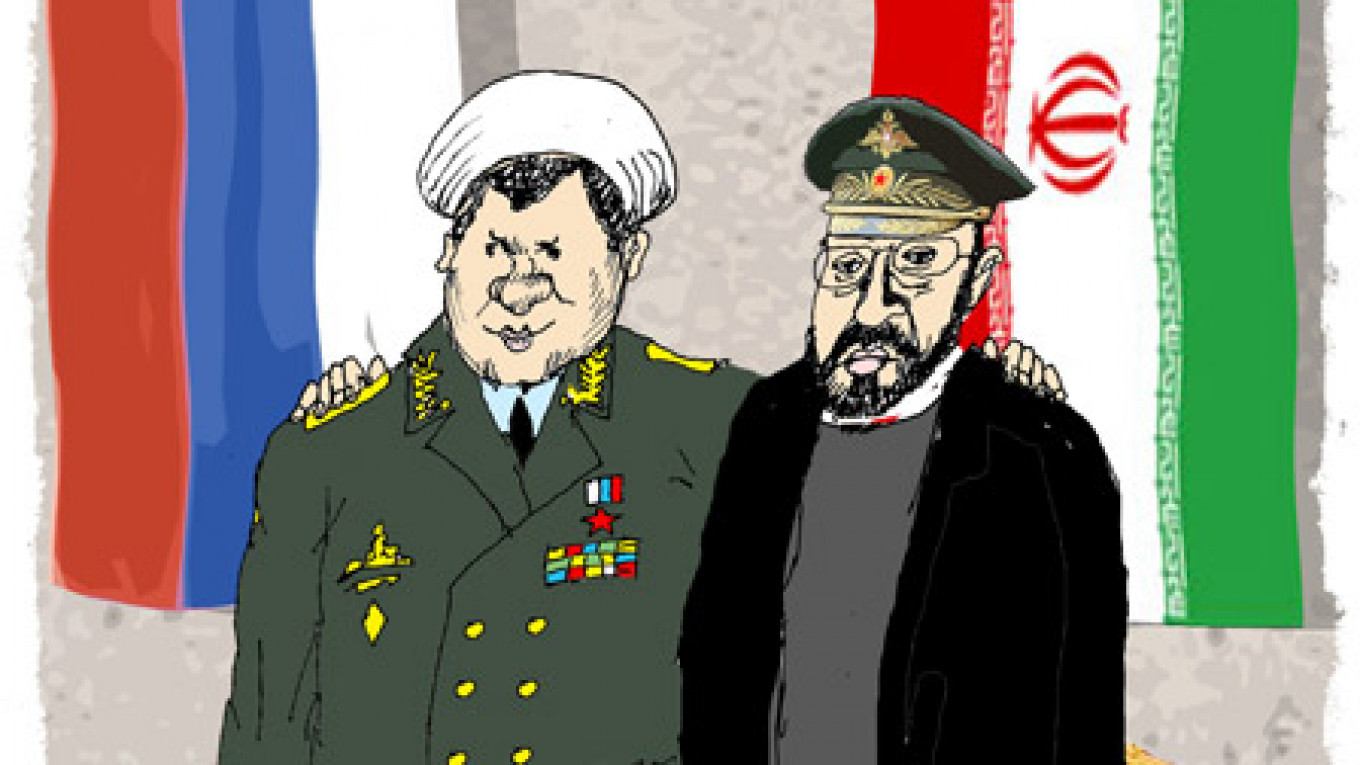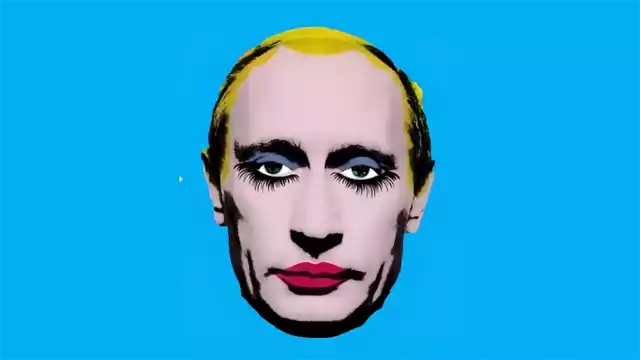Against the backdrop of renewed hostilities in the southern and eastern regions of Ukraine, the Russian public paid little attention to the recent visit that Defense Minister Sergei Shoigu made to Iran.
In practical terms, there was nothing sensational about it. Moscow only hinted at the possibility of renewing a contract for the sale of S-300 air defense systems to Tehran, although that question was never officially discussed. Officials also signed mundane agreements for military cooperation that probably involve such symbolic gestures as mutual visits by delegations, naval vessels to each other's ports and the like.
However, Iranian Defense Minister Hossein Dehghan made an announcement following talks with Shoigu that carried much greater importance. "Emphasis was placed on the need for cooperation between Russia and Iran in the joint struggle against interference by non-regional forces in regional affairs," he said.
Dehghan made no effort to hide the identity of that "non-regional" force. According to Dehghan, all problems are the result of the "destructive U.S. policy of interfering in the internal affairs of other countries."
Whether or not Shoigu had wanted that outcome, his visit allowed the Iranians to actually declare Russia an ally in opposing the United States. In my memory, this is the first time when a rogue state openly referred to Russia as an ally, and Moscow did not disavow it. Thus, the events in Ukraine have brought to its logical conclusion a process that first began 15 years ago.
That was when Russia insisted that its role in the international arena was to represent the "civilized world" in its dealings with the so-called "rogue states" of Iran, North Korea and Afghanistan — states whose actions threatened to destroy the existing world order.
Moscow had inherited extensive contacts with such countries from the Soviet Union, itself having proved willing to support any state — from communists to cannibals — that was willing to follow the socialist path. That approach failed right from the start.
Former North Korean leader Kim Jong Il seemingly promised President Vladimir Putin that he would stop conducting missile tests, and no sooner had Putin announced his great diplomatic victory than the North Korean dictator announced he had simply been joking. The leaders of rogue states might be many things, but they are not fools.
They know that if the time comes to surrender their position, they should do so to a country that can immediately reward them for their actions. In other words, they should make concessions to Washington or Brussels, but not to Moscow.
Over time, Russia has come less to represent the civilized states to the rogue states, and more to defend the rogue states and their interests before the civilized states. The final step in that metamorphosis occurred during Shoigu's recent visit to Tehran. Now Russia has finally moved firmly into the rogue camp.
I would even hazard to say that, having annexed Crimea and unleashed war in southern and eastern Ukraine, Russia now meets all the criteria of a rogue state. This is foremost due the presence of a national dogma, for the sake of which leaders will deliberately sacrifice their citizens' interests.
In Iran, that dogma is radical and fundamentalist Islam. In North Korea, it is the "Juche" cult of Oriental despotism. In today's Russia, it is the connection between imperialism and Russian Orthodoxy, the idea that Moscow can justify using its military to annex part of a neighboring state because Prince Vladimir allegedly received baptism at the Crimean Chersonesos when he brought Orthodoxy to that part of the world.
The main thing is that the Russian leader — like the Iranian Ayatollah and the North Korean dictator — is prepared to easily sacrifice his citizens' well-being for the sake of some vaguely defined "national interests" that are nothing but a mixture of national pride and the leader's own inferiority complex. Today, people are getting killed in the Donbass for the sake of that combustible mixture.
Talks between Russia, Germany and France took place in Normandy last June during the commemoration of the opening of the "second front" in World War II. During that meeting, the European leaders had to practically force Putin to meet with Ukrainian President Petro Poroshenko. It seems to me that the very format of those talks was a concession to Putin's understanding of how world politics are structured.
According to that view, a crisis arises out of a disagreement between major powers, and so those powers gather at a conference where they reach a compromise through mutual concessions and impose their solution on the state in crisis. However, while that model worked in the 19th century and even the first half of the 20th century, it has become entirely ineffective now.
The three participants in these talks are clearly unwilling to consider Russia a superpower whose status and geographic location entitle it to decide the fate of Ukraine. To the contrary, they view Russia as an aggressor whom they want to force into making peace. That is why realpolitik maneuvers meet with no success.
Tired of Russia's constant mixed messages on Ukraine, these partners have made it clear that they are uninterested in holding talks simply for the sake of talking. However, it seems that until only recently, Kremlin leaders believed that if they let the pro-Russian separatists kill just a few more people, those weak-willed Europeans would lift the sanctions.
What's more, even the relative success of the recent meeting between the foreign ministers of Germany, France, Russia and Ukraine has proven insufficient to stop further offensives by separatists equipped with Russian arms and ammunition.
After all, the Kremlin has finally realized that its goal of "federalizing Ukraine" — by which Moscow would exercise full political control over the Donbass and Kiev would have to pick up the bill — is infeasible. That being the case, Russia has chosen to make use of the main resource at its disposal — the lives of civilians in Donetsk and Mariupol.
Kremlin officials believe that the "weak" leaders of the United States and Western Europe cannot countenance seeing women and children die under the hail of Grad rocket fire and will agree to Russia's demands in order to put a stop to the bloodshed. And this points to perhaps the most important factor making Russia a rogue state: The Kremlin is willing to pay for its ambitions and prejudices with people's lives.
At the same time, Russia differs from other rogue states because it is a former superpower and holds the world's second-largest nuclear arsenal. Putin exploits the fact that nobody knows how to deal with a major nuclear power that violates all international agreements. The West had forgotten how it had used nuclear deterrence to coexist with the Soviet Union. Now it will have to open up that playbook once more.
Alexander Golts is deputy editor of the online newspaper Yezhednevny Zhurnal.
A Message from The Moscow Times:
Dear readers,
We are facing unprecedented challenges. Russia's Prosecutor General's Office has designated The Moscow Times as an "undesirable" organization, criminalizing our work and putting our staff at risk of prosecution. This follows our earlier unjust labeling as a "foreign agent."
These actions are direct attempts to silence independent journalism in Russia. The authorities claim our work "discredits the decisions of the Russian leadership." We see things differently: we strive to provide accurate, unbiased reporting on Russia.
We, the journalists of The Moscow Times, refuse to be silenced. But to continue our work, we need your help.
Your support, no matter how small, makes a world of difference. If you can, please support us monthly starting from just $2. It's quick to set up, and every contribution makes a significant impact.
By supporting The Moscow Times, you're defending open, independent journalism in the face of repression. Thank you for standing with us.
Remind me later.







